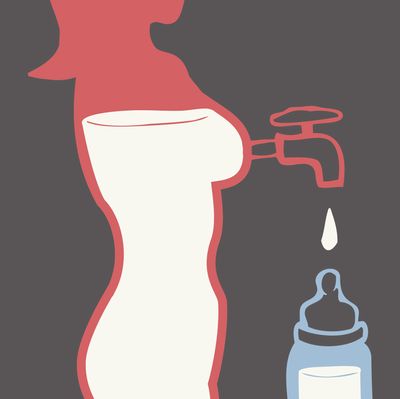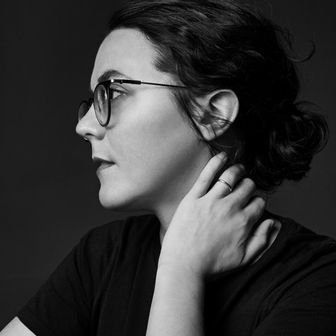
In the 2014 documentary Breastmilk, a community health worker named Patrece Griffith-Murray says she thinks breastfeeding women who cite studies about the health benefits are lying: “Breastfeeding is one of those things that you have to be ridiculously competitive to do, I think. You have to be almost mean about it … There’s a certain kind of push or oomph that goes with breastfeeding that, you know, the off chance your child might not be fat when he gets older is not gonna do it.” I watched Breastmilk while I was pregnant with my son, who’s 16 months old now and happily drinks cows’ milk.
A few weeks after his birth, a specialist told me that my breast milk might make my son’s newborn pancreas work. Most people who have the disease he’d just been diagnosed with are what’s called “pancreatic insufficient” and take digestive enzymes every time they eat. Breast milk, according to this specialist, is so spectacularly fatty that some babies with the same disease attain pancreatic sufficiency without enzymes. For the next year, I breastfed.
Within that year, I went back to work. I pumped, usually at my desk to save time. Various co-workers saw various parts of my body that we both wished they had not seen. At night, I cleaned pump parts and bottles. In the morning, I packed up the whole rattly affair — the pump, its parts, the bottles — into a backpack bulging with ziplock bags. When I pumped or breastfed, I had dysphoric milk ejection reflex, or D-MER — a condition that, to me, felt like plummeting into a dark hole.
“If you hate it so much,” a friend asked mildly, “why are you doing it?” With not a small amount of shrillness, I parroted what the doctor had told me: I was making my son’s pancreas work. It was different, for me. You want to talk about societal pressure to breastfeed? I kept one of my son’s major organs in business, at the expense of my body and mind, for a year.
The specialist who initially emphasized breastfeeding’s importance was a woman; for a variety of reasons, we switched to a man. Every time we saw him, he frowned, asked whether I worked outside the home, and recommended that I add another pumping session to my day. Out of earshot, I railed about how much I resented him, how little he seemed to understand about pumping at 5 a.m. before work, and yet how much all that pumping did seem to be working. Then I kept right on breastfeeding and pumping, the same try-hard type I’ve always been.
To another friend, I breezily claimed that I would have quit long before, if only my baby were healthy. “You’d probably still do it,” she said, and, now that I’ve had some time to think about it, I know she’s right. Intellectually, I’m skeptical of the blanket benefits of breastfeeding, and, as much as I hated breastfeeding and pumping, I know I was lucky. For me, breastfeeding was a choice I was capable of making. My baby didn’t have trouble latching, my body produced more than enough milk, and my employer accommodated pumping.
If breastfeeding was an area where I could achieve — where my expectations matched my reality — then birth was not. Against my plans and desires, I got an epidural. I’m tempted to paint a fuller picture of why that happened, but rather than detail medical history that’s interesting only to me, I’ll tell you that my husband fainted when he caught a glimpse of the needle — he tipped backward just as a contraction bent me in half. In the end, it was, reluctantly, my favorite part of giving birth: the two of us, bodies failing into each other. For once, the earliest parts of parenthood involved the lacking of someone other than me.
There are plenty of solid reasons women choose to go without medication during birth or to breastfeed. There are just as many reasons to get an epidural or use formula. As much as any of us might cite that science — or, when convenient, the opposite science — what’s really happening is a certain part of society is challenging moms and moms-to-be to try something hard. I really love when other moms admit that Griffith-Murray’s theory is sound: It’s not the science, it’s not the health benefits, it’s not some deep-seated desire to be a good mother. Doing something as insane as unmedicated birth or breastfeeding for a year is ambition, a truly bonkers and insane drive to succeed.
Like so much of what’s called ambition, privilege is often the real determiner. It’s true that a body rarely cooperates with plans, especially when it comes to childbearing, but education and health-care decisions about birth are privileges, ones you’re more likely to have if you have money. Breastfeeding and breastfeeding’s accessories are not cheap, and women with higher-paying jobs are more likely to be accommodated for pumping than those without.
Beyond monetary privilege, having a body that cooperates in any capacity is a privilege. Squats won’t make you good at childbirth, and taking supplements won’t close the gap between making enough milk and not, but if and when things work out, it’s tempting to congratulate yourself for above-and-beyond efforts. Which is tricky: I think most women appreciate being commended for “achieving,” whether that means having a baby without medication, breastfeeding for a year, or simply having both a job and a child. But commending someone for breastfeeding for a year suggests, at least partially, that anyone who doesn’t is less deserving of praise.
Like hard-hitting high-school students who knew they could afford an expensive college, moms with privilege often strive to achieve the parenting versions of gold-star standards. It’s something some moms do because they’re driven and because they can. I’m happier admitting it — that what I try to do for my son is at least in part about wanting to feel accomplished — than pretending I’m boxed in by science or society. It’s too bad, because my body has failed me before, and it surely will again. But I was once a try-hard without children, and now, I’m a try-hard mom.





